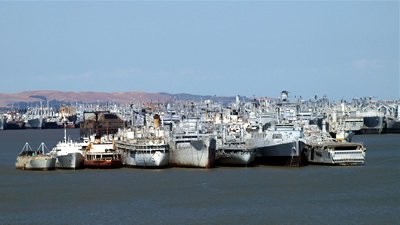In July, some 90 countries signed up to an UNCTAD-FAO-UNEP roadmap towards ending harmful fishing subsidies.
Some non-governmental organizations also signed up, including the World Wide Fund for Nature (WWF). Aimee Gonzales, WWF's ecosystems goods and services manager, explains why the initiative is so important.
 Q: How do fishing subsidies contribute to the problem of overfishing?
Q: How do fishing subsidies contribute to the problem of overfishing?
A: Fishing subsidies account for about 20% of the fishing industry's revenue. These subsidies go to programs like boat building that lead to too many boats chasing too few fish, running these precious resources to the ground.
But we should keep in mind that not all fishing subsidies contribute to overfishing. Not all are harmful.
In fact, some subsidies can be beneficial, for example, by helping industry switch to environmentally-friendly fishing gear which reduces the accidental catch of turtles, smaller fish and seabirds.
Q: How are subsidies linked to illegal fishing?
A: When a specific company receives fishing subsidies, and then fishes illegally, then the subsidy has contributed to illegal fishing. Illegal fishing includes fishing in the waters of a country without authorization, fishing above quota limits, or failing to report what they catch. Fishing in unregulated / unmanaged areas like the high seas is also problematic.
Some boats involved in what we call IUU fishing -- illegal, unreported or unregulated fishing - still receive government subsidies. We know this by tracking the vessels, investigating funding sources, looking at the finances of corporations, interviews. Greenpeace has documented this extensively.
Q: Why is it so important to reform fisheries subsidies?
A: If we don't reform fisheries subsidies, then we risk running out of fish to feed people. Global fish stocks are in dire straits. About 90% are fully fished or overfished.
This is also about people. More than 3 million people rely on the oceans, especially fish, for their food, income, or even cultural identity.
It's also about fairness. Subsidies are going to distant water boats from the EU, Japan, South Korea, and China, which catch many more fish than the local fishermen in developing countries. About 90% of the world's fishermen live in developing countries. They're losing out to the boats which are subsidized.
Q: Why is it difficult to eliminate harmful subsidies?
A: Because the fishing industry is a strong political lobby in some countries. They influence their governments who may lack the political will to reform their subsidies when in fact, given scarce resources, reforming subsidies would help them maximize their investments in the sector.
Subsidies reform in developing countries has to be applied progressively, so that people can manage and countries can implement programs to help the transition to sustainable fishing. There are plenty of examples of how that transition has worked, in both developed and developing countries.
Q: What role could UNCTAD play?
A: By building an alliance of 90 countries and UNEP and FAO, UNCTAD has already played a major role. Now it needs to finish the job and work with other influential players so we can effectively reform subsidies according to the roadmap.
UNCTAD has been very good at highlighting the concerns and imperatives of developing countries. Too often, the developed countries, especially the big coastal nations, come up with the research, reports and politics around fisheries subsidies and only very few developing countries can match those technical resources in negotiations. We need a solution that takes into account the needs and concerns of coastal communities in developing countries. After all, the majority of coastal nations are developing countries. And developing countries are currently the main producers and exporters of fish.


